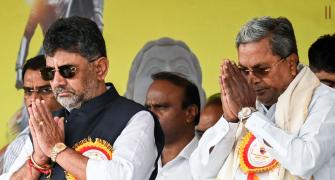Australian police have admitted they had a secret "contingency" plan to keep Indian doctor Mohamed Haneef, then a terror suspect in the failed terror plots in London and Glasgow, behind bars if he was bailed by a Brisbane court.
The details of the plan came to light when the content of the e-mails by federal police, obtained by Haneef's lawyers under freedom of information laws, were published in The Australian on Friday.
An Australian Federal Police spokeswoman confirmed the existence of emails and the plan.
"The emails relate to normal operational contingency planning," the spokeswoman said, adding no further comment from the AFP would be forthcoming.
The emails reveal the police had a plan on the weekend of July 14 and 15, 2007, to ensure Haneef remained behind bars by having Immigration Minister Kevin Andrews cancel his visa under the Migration Act, if Brisbane Magistrate Jacqui Payne bailed him.
The new revelation contradicts comments by Andrews, who has always maintained the revocation of Haneef's visa had nothing to do with the police case against the doctor.
The first email, sent between federal police officers on July 14 and forwarded to a senior public servant in the Immigration Department on July 16, stated, "Contingencies for containing Haneef and detaining him under the Migration Act, if it is the case he is granted bail on Monday, are in place as per arrangements today."
The public servant the email was forwarded to is Peter White, the department's assistant secretary for character assessment and war crimes screening.
White reportedly gave Andrews advice on his authority to cancel Haneef's visa under the Migration Act.
The spokeswoman for Andrews on Thursday night said there was "absolutely no deal or arrangement or contingency instigated, approved, or discussed by the minister or any of his staff at all, ever."
Haneef's solicitor Peter Russo, who provided the original email to a newspaper Web site, said while Andrew's office had denied being involved in the so-called contingency plan, the emails seemed to suggest otherwise.
"It's difficult to exactly say what it means, but the only person who is responsible for the visas is the minister, so," he said, adding, "his office has denied ever receiving any information or putting anything in place, but there's clearly communication between the AFP and the Immigration Department."
Russo said he was limited in what he could say publicly about the emails, as they may become part of Haneef's legal argument during a government appeal against a court decision to overturn the cancellation of Haneef's visa.
The next hearing in that appeal is scheduled for November 15.







